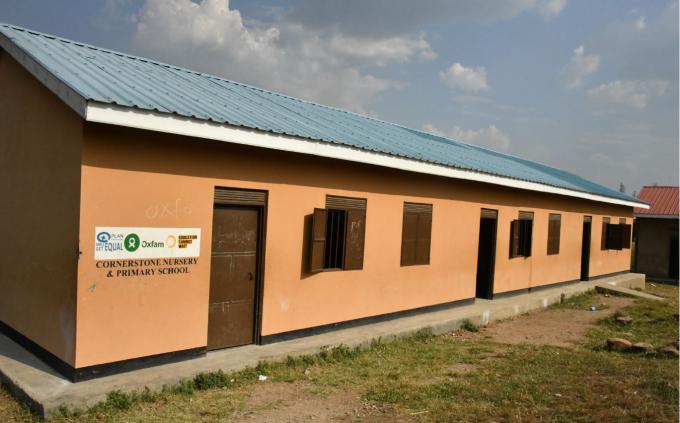TLS support education continuity for IDPs, provide protective learning spaces for children in Nimule
The 3-classrooms block constructed by MYRP partners, Plan International with Oxfam.
Backstory: Increasing access to learning opportunities and ensuring no child is left behind in receiving quality education due to insufficient infrastructure has remained a desire for many schools in South Sudan, including Cornerstone Nursery and Primary school.
The school is located at the foot of Gordon hill in Nimule town in Eastern Equatoria State, South Sudan.
It attracts approximately 1,000 children from the nearby communities owing to the limited number of learning institutions within the region. This has emanated from years of conflict that has been witnessed in the country with the region having not been left out. There are an estimated 8 million Internally Displaced Persons in South Sudan. Out of these, 7 percent live in informal settlements and Nimule Payam, a part of Magwi County, hosts a significant number of the IDPs.
The situation was further made worse in 2016 after families displaced by the conflict along the Juba-Nimule highway sought refuge around Nimule. In the search for opportunities for learning, the existing schools witnessed an influx putting pressure on the already strained facilities at Cornerstone Nursery and Primary school.
Before the 2016 conflict, the school had no adequate learning spaces to enable them to accommodate all the learners within the area. It specifically had no facilities to accommodate learners in P6, P7, and P8. This has had a significant impact on the transition to secondary school for the learners.
The school also lacked learning spaces that are protective of children’s physical and emotional wellbeing due to the absence of infrastructure such as classrooms.
“We only had raised walls but no materials for roofing, doors, or windows. We didn’t have cemented floors for nursery and upper classes,” said Abuni Denis Magui, Headteacher, Cornerstone Nursery and Primary School.
“We sent away children – the majority from the IDP families - coming to enroll in the school due to lack of classroom spaces,” he added.
The weather conditions in Eastern Equatoria state is characterized by relatively very high temperature with limited rainfall. It has a tropical savannah climate where temperatures get to as high as 38°C in February and the lowest is 31°C in July. This situation compounds the already existing challenges that children in school encounter.
Nearly 190 children were already sitting on dusty floors in open-roof classrooms despite the harsh weather conditions in the area. “The classrooms floors were dusty and this mostly affected the health of our children; there were no chairs,” Abuni Denis added.
Programme Activities: The literacy rates among children in South Sudan continue to be among the lowest in the world. The majority of the children classified among categories of marginalization have been deprived the access and retention to school which would ultimately improve their levels in the education outcomes.
To increase access to learning opportunities for Internally Displaced Persons, and host community girls and children, the Multi-Year Resilience Programme [MYRP] through the implementing partners undertakes to increase access to learning by establishment and renovation of learning spaces to provide friendly and safe spaces for learners across the target locations. Through the engagement of Oxfam and Plan International, Cornerstone Nursery and Primary school was provided with construction materials for a new Temporary Learning Spaces which would host 3 classrooms.
Plan International working with OXFAM as the MYRP implementing partner, through the support from the Education Cannot Wait project constructed the 3-classroom block for upper primary pupils by erecting concrete walls, roofing, and installing windows and walls.
Another classroom block undergoing construction at Cornerstone Nursery & Primary School
Change: The learning spaces have helped in increasing retention in Cornerstone Nursery & Primary School, which now retains nearly 1,000 schoolchildren.
“No child, especially IDPs, is sent back home due to lack of space. We now support education continuity for children in Nimule,” Mr. Magui emphasized.
The cemented floors are also easy to clean, and this has gone a long way to ensure children are protected against the spread of infections and diseases resulting from the dusty floors and any other related complications.
“The three classrooms blocks are now safe, and lockable to protect learning materials for the pupils. They are more conducive and benefiting at least 200 pupils,” said Tipa Jackson, ECW Project Team Leader at Plan International.
Through the engagement of the PTAs, the programme has also seen sustainable approaches through the active participation of the community in creating safer accessible spaces for the learners. This will go a long way in creating sustainability of the programme with the community's role in enhancing the demand for quality education in the community.
About ECW-MYRP
Education Cannot Wait is the first global multilateral fund dedicated to supporting education interventions within the emergency setting and in enhancing resilience education approaches across the world. Through the South Sudan Multi-Year Resilience Programme (MYRP), ECW project aims at ensuring that out-of-school children (OOSC) in priority areas have flexible, responsive routes into learning opportunities, that support their transition into further levels of education and that support their holistic wellbeing and development.
Save the Children International, Norwegian Refugee Council (NRC), and Finn Church Aid (FCA) as grantee agencies work together with 17 Implementing Partners across 6 States in South Sudan – under the leadership of the Ministry of General Education and Instruction to ensure that this is achieved in line with the Sustainable Development Goals on education.
Across the different six states, the MYRP implementing partners engage in similar approaches of enhancing access through the provision of additional infrastructure to enhance increased access to learning opportunities. This will additionally work in collaboration with complementing interventions to create access to improved quality education, continuity and transition to other education pathways, enhanced school safety, mental health, psychosocial support, gender, and inclusive education
Story by Daniel Danis/Save the Children
 South Sudan
South Sudan 
